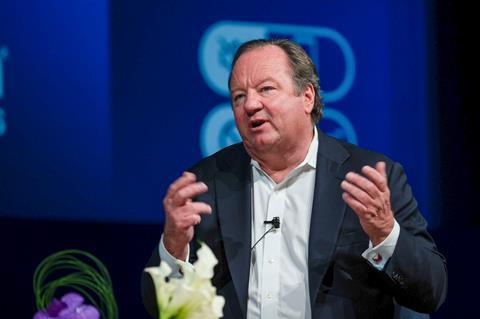
Paramount Global president and CEO Bob Bakish told Mipcom today that he is “optimistic” a deal will be reached to resolve the actors strike “in the near term”.
In a keynote talk after accepting the Mipcom Cannes Personality of the Year Award, Bakish referenced the breakdown of negotiations between Hollywood studios and actors’ union SAG-AFTRA last week, which dashed hopes that the three-month strike by performers would quickly come to an end.
“Yes, things broke down a bit last week, but they [SAG-AFTRA] want to be back on the table. And we’ll get there,” said Bakish. ”Because ultimately, we all want to get back to work.
”We were talking with licencing partners all day [at Mipcom] on CBS shows like Elsbeth and Matlock whose delivery is affected by the strike. We very much want to deliver those shows to the world’s consumers and to our partners. We want people to get back to work. And I’m optimistic we’ll get there as an industry in the near term.”
Bakish said that “none of us are happy that this strike…came to pass. Obviously, it’s stalled the content pipeline, and it’s affecting the livelihood of thousands of people, including, by way many, many that are not union members”.
He batted away industry talk that Paramount had been ‘saved’ by the strikes because they allowed the studio to pause spending at challenging economic time for the company.
“For sure, that’s an overstatement,” said Bakish. “We’ve said publicly that the strike is accretive to cash in 2023. That is true, and that is true for the industry writ large. But to say we were saved by the strike is totally an overstatement. We’re playing the hand we were dealt. We didn’t want there to be a strike.”
Content licencing focus
Elsewhere in his Mipcom talk, Bakish underlined the importance of content licensing to Paramount Global.
“Content licencing was, is and will continue to be a fundamental part of our economic model…it helps get our content in front of as many consumers as possible,” he said. ”It is a profitable multibillion dollar business for Paramount.”
Bakish’s comments come at a time when many studios are rethinking their business models, having previously pivoted to direct-to-consumer with streaming platform launches and away from licencing content to third parties.
At Mipcom this week, one of the key topics of conversation is how studios and streamers are increasingly keen on licencing content and not just warehousing it on their own platforms.
Despite operating SVoD platforms Paramount+, joint venture Sky Showtime and AVoD platform Pluto TV, Bakish stressed that content licencing is “a business we’ve always been committed to”.
“While our peers were pulling back content and putting up walled gardens, we never left. Content licencing was is and will continue to be a fundamental part of our economic model.”
He referenced a licensing agreement that Paramount Global Content Distribution announced at Mipcom this week with Cosmote TV in Greece. Instead of launching its own platform in the country, Paramount will partner with Cosmote TV to create a Paramount+ branded area on its platform.
“It’s the first of many markets we’re going to unlock this way,” said Bakish, pointing out that Paramount would be flexible about being in both the licencing and platform business.
Despite industry talk about the challenges of achieving profitability in streaming, Bakish said it was “vitally important” for Paramount to build a streaming business, noting that consumers are continuing to adopt streaming and that linear is in long term decline.
He said the world had moved on from the “simple” view that studios and streamers should have their own 100%-owned platform in every market around the world. “The reality is, frankly, is not that simple. We believe and are beginning to demonstrate that a more multifaceted approach to streaming, which among other things, embraces partnerships, is the more fiscally responsible and ultimately more financially powerful way to unlock the streaming TAM (Total Addressable Market).”
Asked about the health of Paramount’s streaming business, Bakish reiterated prior guidance. “Today, we’re still saying that [2023 is] our peak investment year in streaming. And we’ve also said publicly that 2024 will be a year of significant earnings growth for the company, driven by significant reduction in streaming losses.”



































No comments yet